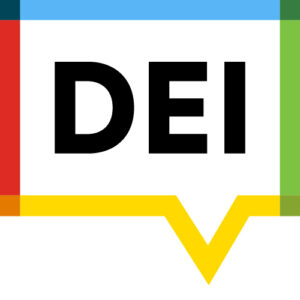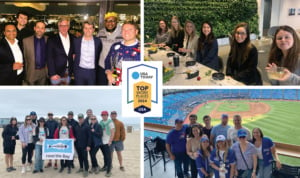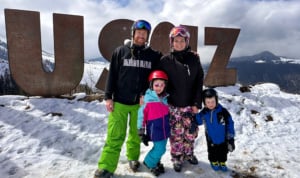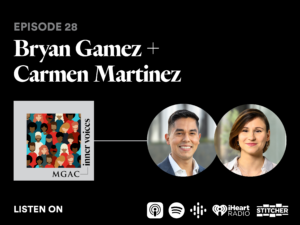MGAC Inner Voices: Episode 20
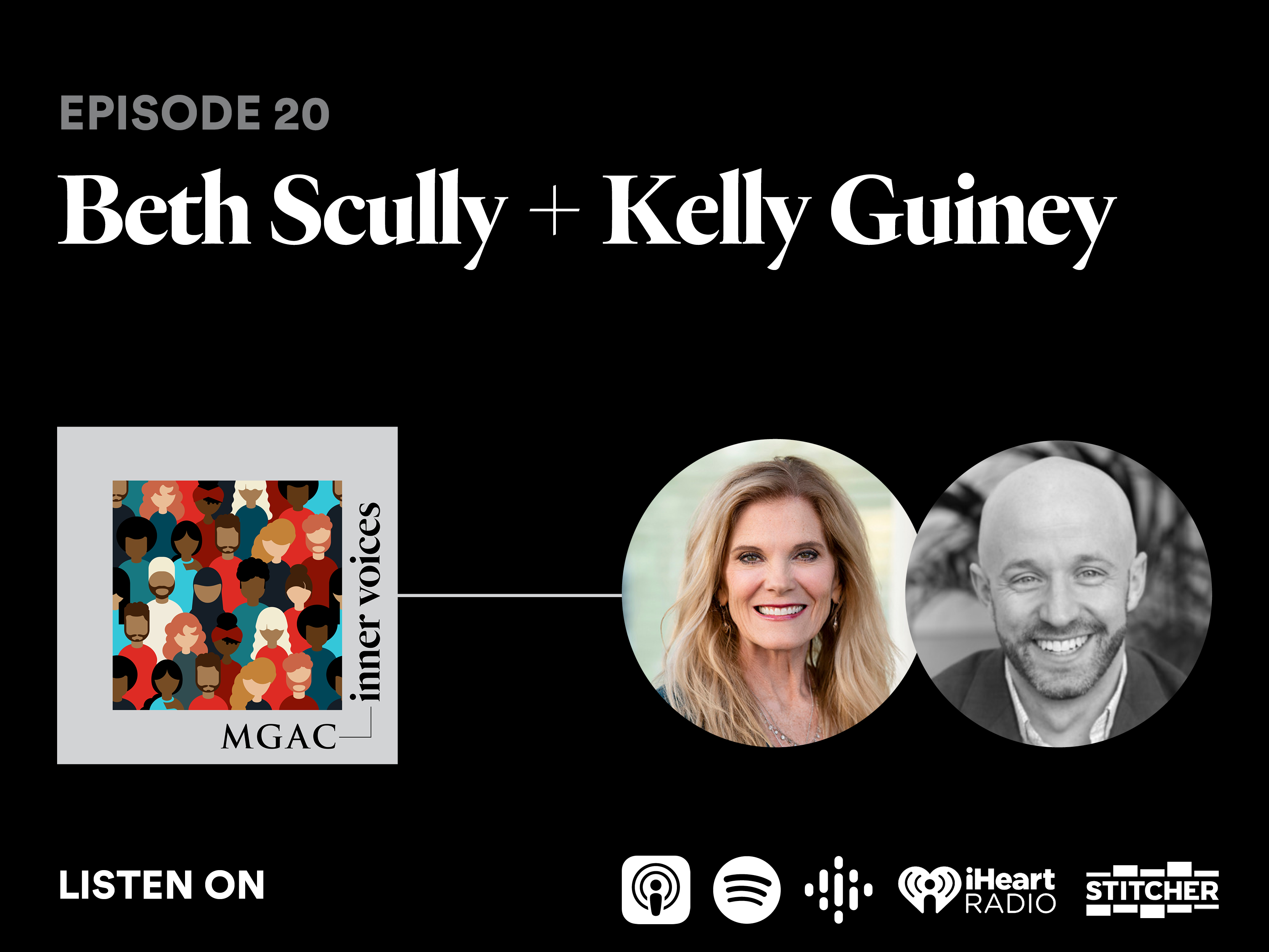
MGAC Inner Voices is an interview format podcast where a diverse mix of employees are interviewed to share their perspective on challenges they have faced in the A/E/C industry as a result of their identity—including race, ethnicity, religion, age, gender, sexuality, ability, etc. By discussing the experiences of our staff, our hope is that their stories will have newfound and powerful resonance with the audience—both to comfort others in similar situations and to encourage those in positions of power to bring about positive, actionable changes to workplace environments for all A/E/C professionals, regardless of their identity.
Beth Scully (MGAC Senior Project Manager, Seattle) talks with Kelly Guiney (MillerKnoll, Strategic Account Executive, Seattle) about his open identity in the construction industry and how his sexual orientation has impacted his experience in the workplace.
View Transcript
Transcript
Beth: Hi, and welcome to MGAC's "Inner Voices," a podcast digging into issues of diversity, equity, and inclusion in the architecture, engineering, construction industry, brought to you by MGAC. I'm Beth Scully residing in Seattle, Washington. I'm a senior project manager out here. We always wanna offer a disclaimer to our audience that this podcast is not by any means two experts getting together to discuss all things diversity, equity, and inclusion. I can speak to my lived experience and do the best to help our guests share their experiences as well.
Our goal is not to hold a platform that espouses our expertise on diversity. We wanna share our stories as a means of bringing them to a personal level that we might not have known in an effort to figure out how together we can create better outcomes for all of us, be allies to those who need us to stand with them in the AEC industry and beyond.
Today, it is great fun for me to be talking with Kelly Guiney, Kelly and I have worked together in the past and have spoken together specifically about this podcast. Kelly, can you tell our listening audience a little bit more about yourself, beginning with your position, your location, your professional background, time in the industry, all the important details of what makes you you?
Kelly: Yeah. So, Kelly Guiney, I'm with MillerKnoll and I focus on strategic accounts for MillerKnoll here in Seattle. I have a degree and background in interior design but primarily have done project management and sales within the industry for the past 18 years, which is hard to believe. And I am a card-carrying member of the LGBTQ community and identify as a gay man.
Beth: Wonderful. I appreciate, again, you joining us, Kelly, and I appreciate the openness which with you bring your full self and that's really the only way that I ever met you, right? When you and I met you were quite openly a gay man, at the time you weren't married, but you and I decided that the focus of this podcast would be that prior to working at MillerKnoll, you did not identify as an openly gay man, is that correct?
And can you let our listening audience know a little bit more about that?
Kelly: Yeah. So, I'd say it wasn't necessarily that I didn't identify as an openly gay man, I was certainly out at that time. And my immediate team and people that I worked close with at my previous company knew that I was gay. But it wasn't necessarily something I was comfortable discussing openly throughout the broader company, or, especially even with my client base at the time, I would kind of find myself if I wasn't 100% comfortable in the situation, or with the individuals within the company, I would hold that part back from me. So, I was out. It's just I wasn't as comfortable kind of speaking to it and being as open about my true self companywide.
Beth: Fair. Fair. But as you reflect on that time, Kelly, I'm wondering, what was the effect on your work? I mean, we talk about bringing your full self to your work. So, if you could help our listeners, what would you identify as the effect on your work as a result of not necessarily always being able to do that?
Kelly: Yeah. And I think since I did have support from my immediate boss, and my immediate team, I mean, we had a very close relationship. So, that helped not to have too much of an impact on the day-to-day, but I think, you know, it certainly impacted my connections throughout the organization. And even not having that comfort level outside of the company, you know, with my client base, that did have an effect on me. I mean, you know within this industry connections are so critical to the work that we do. So, not being comfortable enough, you know, even in the broader company, or being able to bring my full self, you know, even to client meetings, it just it doesn't feel like you can be yourself and that certainly it becomes distracting, at times I found myself holding myself back unnecessarily. And then, you know, it gets to a point where your position in that role or that company is really just kind of left unfulfilled.
Beth: Unfulfilled, that's a really important word. And, you know, I wanna give, like, a little second to that, because we could brush over and just kind of go, "Oh, you know," but when you think about the fact that you cannot bring your full self or you cannot be open, it does leave this void of unfulfillment. Do you feel like that was something that led you away from that employment, or was it just where you were in your life at that time?
Kelly: I think it was probably, like, an underlying kind of, you know, unresolved issue internally. But I would say it was really more kind of the place that I was at that time. You know, the opportunity with Herman Miller at the time just came at kind of, like, the perfect crossroads of where I was at in my career. So, you know, I kind of took the opportunity to jump at that point.
Beth: In your career, in your own personal journey.
Kelly: Yeah.
Beth: Fair enough. So, you know, I don't wanna be spoiler alert for the listening audience here. But I do know that as we fast forward to that opportunity with MillerKnoll it was a very different experience for you. And I wonder if you can speak to that experience?
Kelly: Yeah, I know I've shared with you in the past, I don't even remember kind of how it was positioned. But just from day one, my boss that hired me at the time, just from the get-go, I knew walking into it that it was kind of a comfortable and welcoming space that I could be who I was. I think also just at the time on my own personal journey, you know, I was in this new, very important relationship with my partner, and now husband, and I think it was a time to turn the page. And with the encouragement of, you know, my boss and my team of this new company that I was going into, I just, I wasn't gonna go back to not speaking so openly about something that's so important to me, and, of course, a relationship that I'm so incredibly proud of.
And ever since then, it's just been such a wonderful place where I've always felt so comfortable, not only that I can talk openly about being a gay man, but I'm encouraged from even a corporate level to bring that part of me to work. And I certainly think I felt that way, kind of from day one. But even the last few years, as we've had a female CEO come in, we've seen even more progress made, and I think better representation and leadership too, including the LGBTQ community. So, I think like all companies, we certainly have a lot more work to do. But I think we're doing a good job of focusing on making sure all marginalized groups have opportunity and do feel represented within the company.
Beth: Yeah. But, you know, I've worked with Herman Miller for so many years now, as you know, and I've had such great respect for them as an organization and sort of spearheading and leading the way for other organizations and having that organizational leadership that does identify as gay is a profound statement of support for the community. And MillerKnoll, I know you said has a Global Day of Purpose for employees. And can you speak to how this personally enabled you to feel that support and perhaps other marginalized group that are identified within that Global Day of Purpose?
Kelly: Yeah. So, I think, you know, just a little background on what that is, again, similar MillerKnoll, after the murder of George Floyd and the peak of that continued social injustice we were seeing is when we really started this Global Day of Purpose as one of our DEI actions. And it really was an effort to help lower voting barriers and a way to give back to our local communities as well. It is held on Election Day in the U.S. each year just to make sure all of our U.S. employees can get out and make sure they're using their voice to vote because we all know, that's the strongest thing we all can do, and the the most important, but it's also a way for us to give back and volunteer to our local communities, whether that be a nonprofit organization of a marginalized group or anything from, you know, picking up trash.
So, I think it's just been something from me, personally, just one of the many things that our company has done to really take a stand and recognize that we all can be doing so much more to make sure that we're doing anything in our power, whether it's voting, or whether it's donating our time and services to marginalized communities across the gamut.
Beth: Yeah. And what a beautiful statement of support that you actually identify a whole day to go do this and to participate in it and that you're encouraged. And, you know, I just kind of harken back to the earlier part of our statement, it is just another statement of being able to bring your full, true self to the workplace, and I just marvel at that. We know it's not always the case. But I wanna kind of go off-roading with you here and ask you, what do you think are some of the benefits that come as a result of that? You know, if you're an organization that has not been engaging in any kind of DE&I efforts, or put it on the back burner, how would you encourage them today to rethink that?
Kelly: I think by putting it on the back burner, you're showing your employees that it's not of value to the company. And in that instance, those who identify as a marginalized group, you are not of value to them. So, I think it's critically important, I think, you know, I'm lucky that with MillerKnoll, and formally Herman Miller, it always was a part of our value. But I think if you're an individual that's not able to bring your full self to work, that's gonna have a negative impact, not only on that individual's experience, but for the broader organization as a whole. If someone doesn't feel like they belong, or feel like they're undervalued and not represented, you're gonna lose that critical connection between that individual and the company, that's going to end up holding that individual back from giving their best, and ultimately, the company from progressing. I just think it's critical that every organization be self-reflecting in terms of what they're doing to make sure that everybody is feeling welcomed, everybody has opportunity, and everybody is represented.
Beth: And everybody doesn't feel like they're compromising who they are. Right?
Kelly: Yeah.
Beth: It's so critical. So, as you reflect on your career, Kelly, what advantages are gained by having that diverse workplace?
Kelly: Different perspectives, different experiences, better understanding, hopefully more empathy, that all helps different ways of looking at stuff. And with us in this industry, being such a problem-solving industry, it allows you to look at things in a different way and understand different perspectives, it's going to help generate new ideas and different ways of approaching problem-solving. It's so critical to get that kind of diverse perspective throughout any career, but we certainly need it more in our industry as well.
Beth: For sure, I mean, it's still a very male-dominated industry.
Kelly: Oh, yes, it is.
Beth: And so, you know, it's why we stop and pause and say, "Yay, MillerKnoll for having, you know, the first woman there." Right? I do wanna know, and make this very personal because I believe it is through sharing personally that people are stirred. So, how has your identity made you an asset to your team?
Kelly: I think by especially on the local level here, just bringing more awareness and understanding of the LGBTQ community, you know, there have been a couple of us who identify as part of that community on our team. And I think, again, hopefully, it's helped provide more empathy and understanding from our team members. I know it certainly has impacted my relationship with them and being able to be completely open, they all know my husband, they all have spent time with my husband when I finally introduced him, because I always hold back because everybody ends up loving him more than me. So, I'm selective when I bring him in.
But I think also giving them that comfort level that I am somebody that they can come to if they have questions or trying to understand more, you know, they know I'm a safe place that they can come to, to explore that.
Beth: Yeah, it's beautiful. I think I might take issue with the fact that they ended up liking you more, I think you're both magnificent human beings.
Kelly: Well, thank you.
Beth: So, if we broaden this, you know, we've taken it to a very personal level, and then looking at the industry as a whole, I'm curious what you think, what measures can leaders of organizations take to ensure that people are able to bring their full selves to the workplace?
Kelly: I think, you know, kind of back to what we were saying, get it off the backburner immediately, be vocal about it both internally and externally, you know, making sure they're letting everybody in that company know that equity and inclusion is important to them and that it's critical for their team members to bring their full self to work.
But I think, you know, it can't just be a statement or something that's just put on the website and then done and nothing's made of it, you know, actually take action on it. So, things like creating better support for equity teams and resource groups for marginalized groups, you know, ongoing programs that support and provide more opportunity for marginalized groups, and then expanded out beyond your company to the communities that you're based out of and serving as well.
Beth: Yeah, so important, I think about that a lot in terms of access for communities, you know, do you have equal access to education, to opportunity, and how, as an organization, can you reach and get to those communities to provide that kind of access and encouragement? So, if we look 10 years from now, Kelly, what do you want the industry to look like?
Kelly: Well, going back to that predominantly white, male-led industry, I would like to see the design world taking the lead in diverse representation, specifically, from a leadership perspective, we need more women in leadership, we need more people of color in leadership, we need more from the LGBTQ community being represented as well. And it's just I think we have so far to go in that aspect that, you know, I want those percentages flipped, or at least a lot closer to a median than where they currently are.
Beth: Yeah, I often go to different organizations, their landing page, and then when it says "About Us," I look, you know, I look at the pictures, how diverse are you? You know, for me, if I can personalize that, I want that to be a tile page of diversity. Right?
Kelly: Absolutely. Yeah. And I think I will say, you know, again, just speaking, from my own personal experience, and how proud I am of MillerKnoll and the progress that we have done, if you go out to our website, and you look at that impact section, it's pretty powerful to see the steps that our company has taken, certainly in the past two years, three years, now we're coming on, but every company should have that. And again, it's not just a statement out there, it's you're showing and doing the work and all of the action that comes with it.
Beth: Yeah. So, bringing it now to a very individual level, it's the mission of our podcast to expose stories like yours, and journeys of our participants in an effort to help us recognize that the struggle is real for those who are marginalized. We haven't gotten too deep into struggle, because, you know, as you and I have talked about, you've experienced a really beautiful company that embraces and supports and in fact encourages this, but we didn't know that the struggle is real for those that are marginalized. And for those who may not have personal experience with discrimination and negative treatment, what advice would you give them on how to be an ally?
Kelly: Be curious, like, try to go out and understand more, ask questions, but also do the work on your own to know what is and isn't appropriate to ask. There are so many resources out there, especially now, you know, to really learn what marginalized groups experience on a daily basis if you just put in the tiniest bit of effort. But I think most marginalized people, they wanna share their story, they want people to understand the struggles that they've gone through. So, don't be afraid to have a conversation with it. But, you know, I also think that there's so many little things on a day-to-day basis just to show people that you're an ally or a safe space, anything from putting an ally pin on your bag or your pronouns in your email signature. It's just simple things like that, that show marginalized groups that you do understand, you have an awareness, and that you are a safe person that they can confide in.
Beth: Thank you. Thank you for that. Our time is drawing to a close but I don't want to end without really expressing my deep gratitude to you for coming forward and participating in our podcast this afternoon. We could probably spend long hours having a great deeper discussion of this but I just want to say thank you and let you have any last or closing thoughts here.
Kelly: Well, I just wanna extend the thanks to you as well for including me, but also just continuing to do this work and hear these voices and it's so incredibly important. And so I really appreciate you doing that and look forward to continuing to hear other guests you have on in the future.
Beth: Thanks, Kelly.
Kelly: Thank you.
Beth: That concludes this podcast of MGAC's "Inner Voices." Thank you so much for joining us. And please, check back next month for another episode of "Inner Voices."
